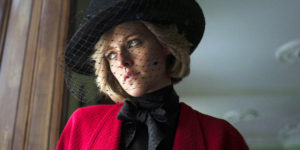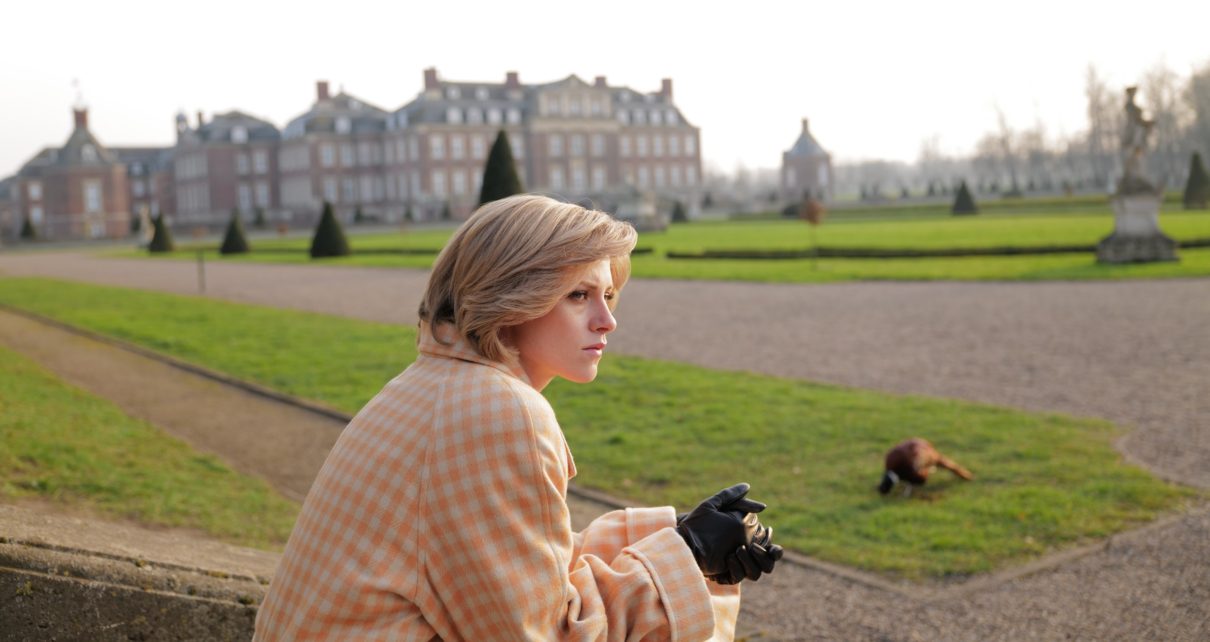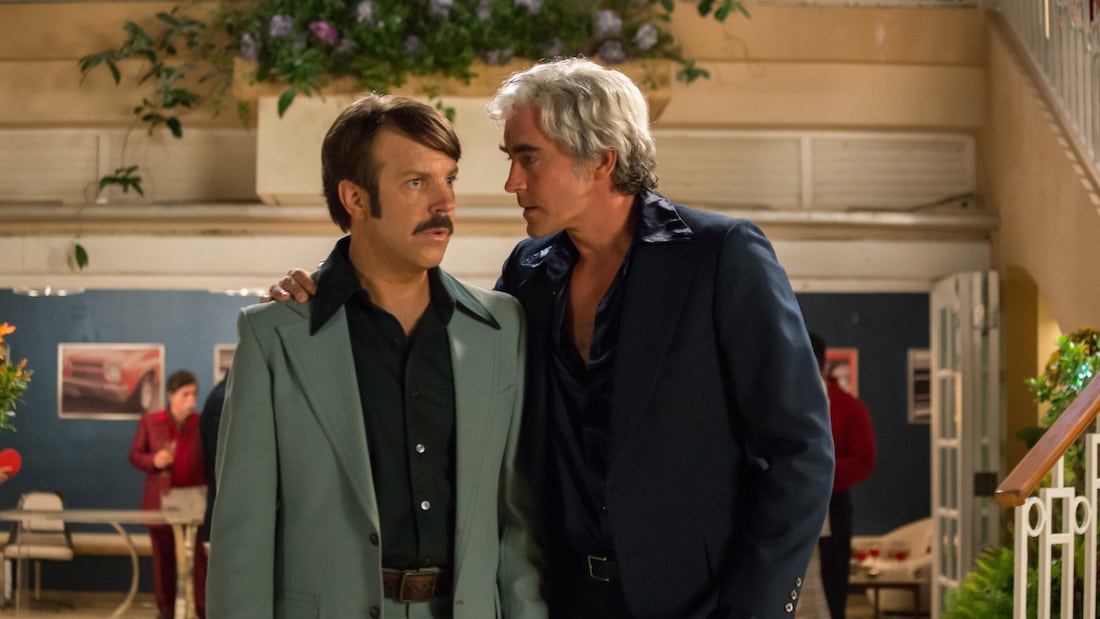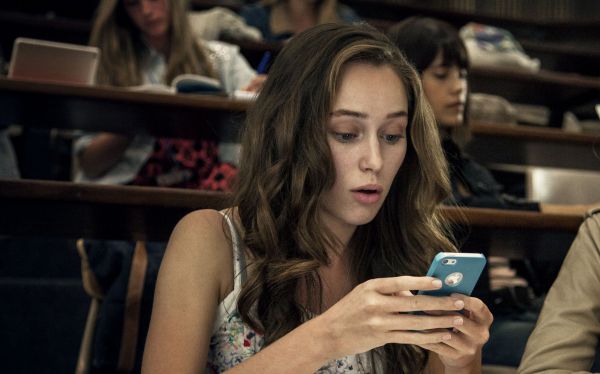Here’s my impression of Kristen Stewart first reading the script for Spencer: “Why does it say: ‘Diana looks wistfully off into the distance’ on every page?”
Spencer is prefaced with the phrase: “A fable from a true tragedy.” So this film is a re-imagining of what might have gone down in Lady Diana’s quest for freedom. And, sure, it could have happened this way … assuming we’re taking for granted that Diana was a consummate rebel, small-time exhibitionist, and certifiable loony. Every time I see a biopic, I ask myself: “Does the director like their subject?” And I honestly don’t know in this case — Pablo Larraín clearly sympathizes with his subject, but that’s not the same thing. For me, the question remained unclear until the final ten minutes of film.
clearly sympathizes with his subject, but that’s not the same thing. For me, the question remained unclear until the final ten minutes of film.
It’s Christmas week, 1991, and the English royals have decided to retreat to the Queen’s Sandringham Estate in Norfolk for the holiday. Princess Diana is late. This is a running theme. The film is 100% about Diana, btw. I thought maybe the film would play like “The Crown,” but no such luck. Instead, the film plays more like what you’d get if you took a Clint Eastwood Western and removed all the guns and foes and plot and just filmed Clint walking around looking sour. The next biggest roles in Spencer belong to Major Alistair (Timothy Spall), the estate warden, and Maggie (Sally Hawkins), the royal dresser –and at that the latter is absent for the entirety of act II. Reflecting back, I’m not even sure Queen Elizabeth had any spoken dialogue.
Diana ain’t happy. Such is exacerbated by several factors beginning with the fact that Prince Charles has made little secret of his extra-marital affection for Camilla Parker Bowles. As Diana roams the grounds, she starts having visions of Anne Boleyn, the would-be queen that King Henry VIII had executed because he loved another woman . Diana starts seeing conspiracies all around her. The conspiracies, however, will have to wait. It’s time to get dressed for dinner, D. It’s only three hours away, hurry up!
. Diana starts seeing conspiracies all around her. The conspiracies, however, will have to wait. It’s time to get dressed for dinner, D. It’s only three hours away, hurry up!
When not obsessed by Anne Boleyn or cheatin’ chuck, Diana wants to revisit her childhood home which is – as coincidence would have it – just right over yonder, all boarded up. She discusses grammar and tenses with her pre-pubescent children. It’s pretty clear Diana doesn’t like the present of the future, but given her current title as Princess of Wales and her knowledge of history, she can’t help thinking there’s little difference between past and present, which only depresses her more.
This, btw, might be the role KStew was born to play. No actress has ever taken one-dimensional self-pity to an art form quite like Bella Swan in five Twilight films. And it’s not that we don’t feel for Diana; it’s that as viewers we feel as trapped as the protagonist. You want something else, babe? Yeah, so do we.
viewers we feel as trapped as the protagonist. You want something else, babe? Yeah, so do we.
Spencer didn’t do much for me. I wasn’t a fan of watching it at the time and feel even more resolute in retrospect. The film comes off as both slow and depressing. A lot of shots of Diana looking pained until she decides to defy somebody … which leads to bulimia or minor self-mutilation. With a deliberate focus on Diana’s personal being and how she responds to the minutiae of daily life – getting dressed, waiting for dinner, avoiding the press, wondering and wandering about the estate – this film is intended to be a personal reflection, not some cookie-cutter Hollywood blockbuster. This is 100% the kind of film you make when you want to criticize Hollywood for lack of realism, and yet, Spencer has a feel-good Hollywood ending, one that completely defies the 100 minutes that preceded it. We know Diana. We see this Diana. Giving this woman, this character, a feel-good ending is not only illogical, it insults us. On top of that, the magical happy ending has to be cherry-picked among a sea of depression; it’s not like the woman loved her life.
be a personal reflection, not some cookie-cutter Hollywood blockbuster. This is 100% the kind of film you make when you want to criticize Hollywood for lack of realism, and yet, Spencer has a feel-good Hollywood ending, one that completely defies the 100 minutes that preceded it. We know Diana. We see this Diana. Giving this woman, this character, a feel-good ending is not only illogical, it insults us. On top of that, the magical happy ending has to be cherry-picked among a sea of depression; it’s not like the woman loved her life.
I don’t mock the portrayal of Diana, but I do wonder how necessary it was to fictionalize or embellish Diana’s depression. Seems to me there wasn’t much need for it. Either way, I’d rather be watching “The Crown.”
Royalty comes with a neverending “Why?”
For pomp, an inordinate supply
This stuffy perseverance
It’s all about appearance
Sometimes, don’t you just want to Di?
Rated R, 117 Minutes
Director: Pablo Larraín
Writer: Steven Knight
Genre: Bio-fiction
Type of being most likely to enjoy this film: People who hate the royal family, maybe?
Type of being least likely to enjoy this film: Royals



